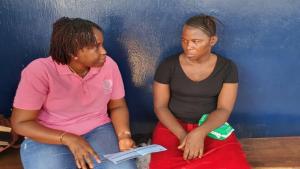Reaching Underserved Communities: Cervical Cancer Awareness in Sierra Leone
In an ongoing effort to eliminate cervical cancer, the Ministry of Health (MoH), in collaboration with the World Health Organization (WHO) Sierra Leone, organized a crucial screening initiative during Cervical Cancer Awareness Month - January. This initiative focused on underserved communities, encouraging women aged 25-49 to take advantage of essential screening services.
Cervical cancer is the second most common cancer among women in Sierra Leone, following breast cancer. With approximately 1.7 million women aged 15-49 at risk, the urgency for proactive intervention is clear. Each year, an estimated 512 women are diagnosed, and 189 lose their lives to the disease. Recognizing this alarming reality, the screening drives took place on January 23, 2024, at the Tombo Community Health Centre (CHC) and Princess Christian Maternity Hospital (PCMH), reaching densely populated areas where access to healthcare is often limited.
A total of 62 women participated in the screening, with nine testing positive for the virus. These women received immediate treatment, in line with the National Policy and Strategy for the Elimination of Cervical Cancer 2023-2028. The initiative supports Sierra Leone’s commitment to achieving WHO’s ‘90-70-90’ targets by 2030, aiming to eliminate cervical cancer as a public health concern. Since 2020, significant progress has been made, with 18,944 women screened across nine districts in 2024 alone, including WAU, WAR, Bo, Bombali, Kono, Moyamba, Port Loko, Tonkolili, and Kenema.
One of the beneficiaries, Hawanatu Kalokoh, a 25-year-old mother of two and a mother mentor, shared her experience. She had never undergone cervical cancer screening before and was grateful for the opportunity. "I had never done this before, and I was so glad to receive this service," she said. When she tested positive for the virus, she received immediate treatment, a moment she recognized as life-saving. "I thank God because I could have lived with the virus without knowing, which could have led to cancer."
Hawanatu’s story underscores the importance of early detection and treatment. Women who tested positive not only received prompt medical care but also counseling to help them understand their condition and plan for follow-up visits. Emphasizing the accessibility of the free service, Hawanatu encouraged other women to take part. "I urge all women to participate. It is free, and I am so happy it was available to us who cannot afford it."
